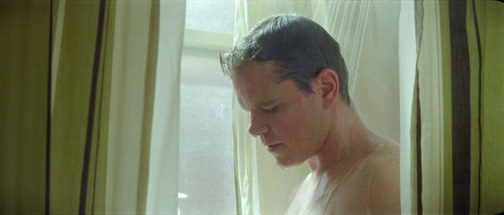Movie Review: Hereafter
By Matthew Huntley
October 20, 2010
BoxOfficeProphets.com

The film tells three separate stories that run in parallel, each linked by the theme of characters coming to terms with death and the afterlife. Story #1: A French television journalist named Marie Lelay (Cécile De France) is on a tropical vacation with her boss-lover (Thierry Neuvic) when a tsunami strikes. In a scene that’s just as shuddering as it is eerily convincing, Marie gets trapped in a road flood and is struck in the head. Before she’s resuscitated, she has what appears to be a vision of the other side, including other souls. The experience leaves her reflective, curious and strangely fascinated.
Story #2: George Lonegan (Matt Damon) is a lowly bachelor living in San Francisco. He used to work as a psychic but found that being a conduit between the living and the dead was too much to bear. As he tells his older brother (Jay Mohr), his ability is more of a curse than a gift. Now he’s a factory worker who attends adult education classes and listens to Charles Dickens books on tape. He lives a sheltered, lonely life, albeit a peaceful one.
Story #3: In London, twin brothers Jason and Marcus (Frankie and George McLaren) try to support their alcoholic mother (Lyndsey Marshal) so they won’t be taken away by Child Services. When Jason runs out to fill his mother’s prescription, he’s attacked by street hoodlums and killed by an on-coming car. Marcus is sent to live with foster parents and wants only to make contact with his deceased brother. He searches the Internet for psychics who claim they can help him find the answers.
Each of these stories is so thoughtful and earnestly told they could exist independently of one another, and most of the time, they do. For the greater part of the film, the narratives are linked only by common theme and it’s not until the very end when they actually intersect. To their credit, they don’t rely on contrived coincidences, meet-cutes or shocking twists to hold our attention. They also don’t depend on standard Hollywood sensationalism. Each is simple but engaging in its own right; we feel like we’re getting three good stories for the price of one.
What’s refreshing about Peter Morgan’s screenplay is it looks at each situation from a practical point of view, which coincides with one of the film’s main arguments - that discussions about the afterlife are not taken seriously in the media and that people automatically assume the topic is apolitical, unimportant or too outrageous to entertain. In one of the film’s best scenes, Marie visits a hospice where a scientist talks candidly about the possibilities of experiencing death before actually dying. The dialogue is bright, intellectual and delivered frankly, suggesting Eastwood is mostly interested in making a solemn drama with smart characters who believe they can reach solace through truth and discovery.
Because the film is about the afterlife, we assume it will eventually come back to a traditional formula and perhaps play out like a ghost story or supernatural thriller, but it transcends such a formula and instead goes places that are more interesting and unexpected. Consider the blossoming romance between George and Melanie (Bryce Dallas Howard), his cooking partner from night class. They’re attracted to each other and eventually find their way back to George’s apartment. Naturally, we expect one thing to happen, but then something else does, and it’s completely believable. I’ll not reveal what it is, but the film is full of moments like this, which makes it hard to know where it’s going or what will happen.
The film’s only notable flaw is its pacing. Like many Clint Eastwood films, this one moves slower than necessary. I think it’s because Eastwood films too many shots that are simply transitions from one scene to another and because he holds on them for too long. For instance, there’s a shot of George getting ready to leave his apartment and we see him place a shirt out to wear. We also see Marcus slowly walk to a computer before searching for psychics on Google. There’s also a lingering shot of George and Melanie driving away in her car. Normally such moments shouldn’t stand out, but in the case of Hereafter, they do. I understand Eastwood wanting to create a certain level of naturalism and not wanting to be in any rush, but I think a tighter editing job might have generated greater tension and moved each story along with more urgency. We’re still interested in everything that’s going on, but I think a faster pace would have made it more exciting to watch.
After seeing Hereafter, I’m still not a firm believer in psychics or visions of the afterlife, but the film convinced me it’s an area of science (as well as spirituality) the public should take more seriously and without shame. I’m curious to know just how much clandestine research is being conducted because its believers are shunned by mainstream culture. Are there really secret laboratories? For me, it’s a phenomenon that’s got to be experienced to be believed, but just as we find ourselves so easily wrapped up in the day to day events of our living lives, we should be able to consider what lies beyond our world with a clear and open mind. That’s one of the lasting lessons Hereafter teaches us, along with being a thoughtful, uncommon drama.